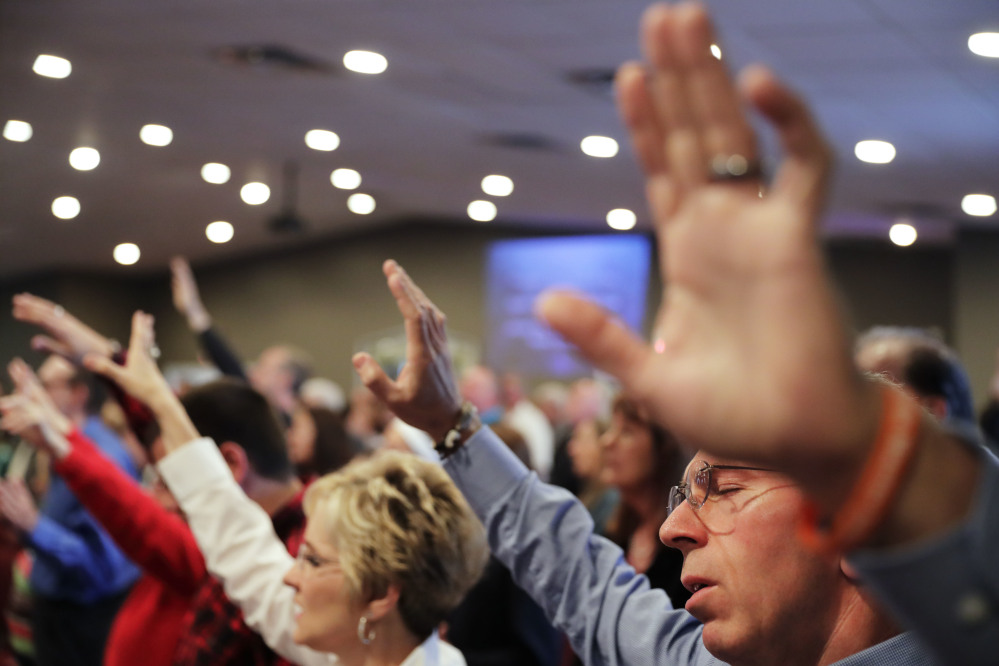The Associated Press
BENTON, Ky. — Pastor Richie Clendenen stepped away from the pulpit, microphone in hand. He walked the aisles of the Christian Fellowship Church, his voice rising to describe the perils believers face in 21st-century America.
“The Bible says in this life you will have troubles, you will have persecutions. And Jesus takes it a step further: You’ll be hated by all nations for my name’s sake,” he said.
“Let me tell you,” the minister said, “that time is here.”
The faithful in the pews needed little convincing. Even in this deeply religious swath of western Kentucky – a state where about half the residents are evangelical – conservative Christians feel under siege.
For decades, they say, they have been steadily pushed to the sidelines of American life and have come under attack for their most deeply held beliefs, born of their reading of Scripture and their religious mandate to evangelize.
The 1960s ban on prayer in public schools is still a fresh wound. Every legal challenge to a public Nativity scene or Ten Commandments display is another marginalization. They’ve been “steamrolled,” they say, and “misunderstood.”
Religious conservatives could once count on their neighbors to at least share their view of marriage. Those days are gone. Public opinion on same-sex relationships turned against conservatives even before the U.S. Supreme Court legalized gay marriage nationwide.
Now, many evangelicals say liberals want to seal their cultural victory by silencing the church. Liberals call this paranoid.
But evangelicals see evidence of the threat in every new uproar over someone asserting a right to refuse recognition of same-sex marriages – whether it be a baker, a government clerk, or the leaders of religious charities and schools.
At a time when America’s divisions – right-left, urban-rural, black-white and more – spill daily into people’s lives, many Christian conservatives find themselves on the other side of the divide between “us” and “them.”
“There’s nobody hated more in this nation than Christians,” Clendenen preached on a recent Sunday. “Welcome to America’s most wanted: You.”
Evangelicals like those at Christian Fellowship are wrestling with their declining clout in public life.
The U.S. remains solidly religious and Christian, and evangelicals are still a formidable bloc in the Republican Party. But a series of losses in church membership and in public policy battles, along with America’s changing demographics, are weakening evangelical influence, even in some of the most conservative regions of the country.
“Nobody would have guessed the pace of change. That’s why so many people are yelling we have to take our country back,” said Ed Stetzer, executive director of Lifeway Research, an evangelical consulting firm in Nashville, Tennessee.
The Protestant majority that dominated American culture through U.S. history has dipped below 50 percent. Liberal-leaning Protestant groups started shrinking earlier, but some evangelical churches are now in decline. The conservative Southern Baptist Convention lost 200,000 from its ranks in 2014 alone, dropping to 15.5 million, its smallest number in more than two decades.
At the same time, the Bible Belt, as a cultural force, is collapsing, said the Rev. Russell Moore, head of the Southern Baptist public policy agency.
Nearly a quarter of Americans say they no longer affiliate with a faith tradition. It’s the highest share ever recorded in surveys, indicating the stigma for not being religious has eased – even in heavily evangelical areas. Americans who say they have no ties to organized religion now make up about 23 percent of the population, just behind evangelicals, who comprise about 25 percent, according to the Pew Research Center.
Politically, old guard religious right organizations such as the Moral Majority and the Christian Coalition are greatly diminished or gone, and no broadly unifying leader or organization has replaced them. In this year’s presidential race, the social policy issues championed by Christian conservatives are not central, even amid the furor over bathroom access for transgender people.
White evangelical voters remain very influential in early primaries, and they turn out at high rates in general elections. But they can’t match the growth rate of groups that tend to support Democrats – Latinos, younger people and Americans with no religious affiliation.
Preaching, Clendenen urged congregants to hold fast to their positions in a country that has grown hostile to them.
“Don’t give up,” he said. “Don’t let your light go out.”
Send questions/comments to the editors.



Success. Please wait for the page to reload. If the page does not reload within 5 seconds, please refresh the page.
Enter your email and password to access comments.
Hi, to comment on stories you must . This profile is in addition to your subscription and website login.
Already have a commenting profile? .
Invalid username/password.
Please check your email to confirm and complete your registration.
Only subscribers are eligible to post comments. Please subscribe or login first for digital access. Here’s why.
Use the form below to reset your password. When you've submitted your account email, we will send an email with a reset code.